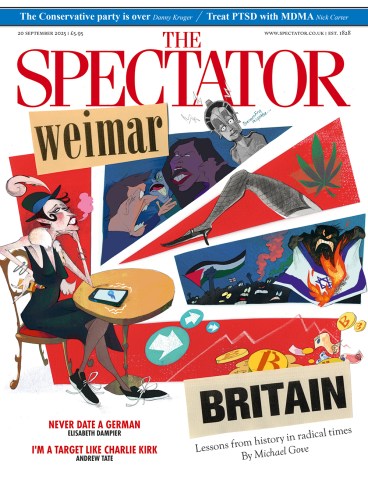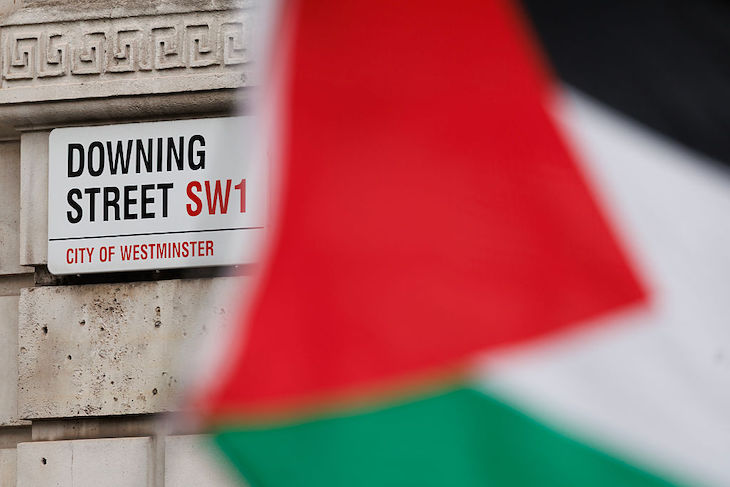
The Ancient Greeks believed the past was in front of us and the future behind. Man could look history in the face and learn from it, while the future was unknowable, hidden, the wind whistling at our back.
It is in history, its patterns, and what it reveals about human nature, that we have the best guide to our times and how they might develop. The government may wish us to focus on innovation this week – new nuclear reactors, AI data centres, OpenAI’s Sam Altman and Nvidia’s Jensen Huang at the state banquet – but if we really want to understand the convulsions gripping our society it is to the past we should look for signs.
The tens of thousands who marched through London at the weekend demanding their country back has been reported as an unprecedented example of mass reactionary protest – a new militancy in defence of what has been lost. But we have seen this before. In Tudor times the Pilgrimage of Grace was a grassroots uprising in defence of the old Catholic faith and against Henry VIII’s modernisation. The Sacheverell riots in 1710 were a popular reaction in favour of tradition against the Whig commercial elite. The Luddites of the early 19th century were resolute for the inherited ways of working against the restless apostles of change. The phlegmatic nature of the English character should not be mistaken for placidity, especially when what is customary, familiar and traditional is challenged, as it has been in the past two decades by wrenching economic and demographic change. Kipling was right to warn that elite condescension towards provincial England is a dangerous path: ‘When he stands like an ox in the furrow – with his sullen set eyes on your own, / And grumbles, “This isn’t fair dealing,” my son, leave the Saxon alone.’
The rise of Reform and the threat it poses to the two-party duopoly is also foreshadowed by our past. While the SDP’s failed attempt to break the mould in the 1980s may prove comforting to the established parties – lulling them into thinking such movements come and go – they should look back further. The eclipse of the Liberals in the 1920s as Labour became the party of progress shows that once-mighty political organisations can be crushed into atoms. The Liberals and their predecessors were in power for 63 of the 90 years from 1832 to 1922. After that they were a series of historical footnotes.
Reform’s rise and the Pilgrimage of Tommy may have precedents in Britain’s past, but it is to another country and another time we seem to be drawn in seeking to explain all the discontents of our present – the Germany of the 1920s and early 1930s. History may not repeat itself, but it does rhyme – and we can hear the echoes of the Weimar Republic in our current crisis.
The intellectual and cultural energy is, as it was then, with the most radical and transgressive forces
Any mention of the agonies of 20th-century Germany risks descending into overwrought references to Nazis at the threshold of power. Any comparison to that era demands care. To be clear, there is no figure in our own politics that should be compared with the Austrian corporal. But other parallels are inescapable. Critically, one of history’s most important truths is that no path is predetermined, and if we can attend honestly to its lessons, we can also avoid its tragedies.
The first warning from Weimar is our politics has increasingly moved from the capital’s corridors to its streets. The Robinson rally followed months of marching from those proclaiming solidarity with Palestine. Like the reds and reactionaries of postwar Germany, Rosa Luxemburgs on one side, angry veterans on the other, the partisans of contending factions coalesce around their flags – the Palestinian banner or the cross of St George – and make tribal identity their cause.
Street agitation reflects frustration with the failure of democratic politicians to deliver. Weimar’s final years were marked by a rapid turnover of heads of government, each struggling to assert themselves over a fractious political culture in which the intensity of rhetorical energy was matched only by the absence of any administrative grip. In our time, the three prime ministers of the last two Conservative years have given way to an enfeebled Labour leader openly derided by his own intimates and increasingly incapable of asserting any authority.
Anger with politicians’ failure has been exacerbated by economic insecurity. While we have never suffered inflation on the scale of Weimar, the rising cost of living – especially the price of energy – has made many poorer and the state of the public finances leaves our currency dangerously close to Reichsmark territory.
In this climate, the intellectual and cultural energy is, as it was then, with the most radical and transgressive forces. In Weimar, the right in the 1920s and 1930s did not defend the existing constitutional settlement but sought a reactionary revolution, an untrammelled executive clear about how to take on the enemy within. The appetite for a future right-wing government in Britain to rule without constraint, with existing conventions discarded, is growing. And the intellectual forefather of such ‘decisionism’, Carl Schmitt, is enjoying a new vogue today among the right’s young intellectuals.
While Germany’s right saw the middle-class establishment as compromised by consensual softness, the left considered them a barrier to liberation. Artists, polemicists and others who placed themselves in the cultural vanguard sought to dismantle traditional gender roles, ridicule bourgeois values and deride patriotic attachment. Faced with assault from both radical right and revolutionary left, the political home for the middle – the Centre party – could not hold.
One of the most chilling parallels between those times and ours is that as traditional structures buckled, those who felt the pressure first, and most forcibly, were the Jewish population. Anti-Semitism is the new normal in contemporary Britain – synagogues daubed with faeces, Jewish students shunned by contemporaries on campus, Jewish goods boycotted, Jewish bodies assaulted. Musicians call for the killing of Jews from the Glastonbury stage and politicians supportive of the Jewish state are targeted by thugs. Last week it was the Labour MP Sharon Hodgson, whose constituency office was attacked. In 2021 it was Tory MP David Amess, murdered by an Islamist fanatic who had tried six times to kill me.
So the concern I feel is not performative or contrived; it is personal and profound. But there are grounds for hope. One country met the challenge of the 1930s with a restoration of faith in democracy and capitalism: Roosevelt’s America. FDR showed that if you restore agency to government, if you show you won’t be cowed by the courts and if you believe in national greatness then you can turn back the tides of despair and division. If your lodestar is ‘the forgotten man’, the citizen who has been disempowered by global forces and who you will restore to dignity, you can forge a brighter future.
There are lessons for our time – whether they be for Prime Minister Starmer, Badenoch or Farage. The institutions of government should be engines for change, not shelters for bureaucrats, ATMs for the idle or playgrounds for lawyers. The challenges differ in some respects from the 1930s, but the essence of the answer is the same – put the tools of national democracy to work for those who’ve been ignored, condescended to and impoverished by the unaccountable, the insufferable and the international.
Secure our borders, build the homes and infrastructure we need, revive manufacturing with energy abundance, reject cultural relativism, restore legitimate authority to our streets, use the state to sponsor cultural projects that cultivate pride in our nation, support democracies abroad and deny oxygen to extremists at home. That will require setting aside international conventions that have had their time, repealing EU laws that our courts have made into economic opioids, appointing to cultural institutions leaders who believe in celebrating Britain, requiring universities to be incubators of homegrown science, not finishing schools for Chinese communists, and facing down the rainbow-crescent alliance of radical leftists and revolutionary Islamists who feed on national self-doubt.
Ambitious? Perhaps. Necessary? Un-doubtedly. The reason the comparison with Weimar needs to be made is that unless democracy can respond effectively to multiplying challenges then the institutions which have kept us safe and prosperous over generations will further decay to the point where many would prefer to burn them down rather than refurbish and renew.
What lies in front of our eyes is a home so many of us have been brought up to love, now looking neglected, its stewards bewildered, its walls crumbling. We have seen it shaken before. We know it can be restored. But at our back a wind is growing which is tempest-strong and unconstrained. Will we learn from our forebears, before it is too late, how to endure it?








Comments